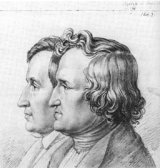The Story of the Youth Who Went Forth to Learn What Fear Was
This classic fairy tale by the Brothers Grimm revolves around a young, fearless boy who decides to venture into the world to understand the meaning of fear. The tale follows his bizarre adventures which involve haunted castles, mysterious beings, daunting tasks and strange experiences. Pushed by his curiosity and courage, the boy transforms the horrifying into the comical, ultimately learning about fear in an unexpected way.
Genre: Children
Genre: Children
- 19 Views
A certain father had two sons, the elder of who was smart and sensible, and could do everything, but the younger was stupid and could neither learn nor understand anything, and when people saw him they said: ‘There’s a fellow who will give his father some trouble!’ When anything had to be done, it was always the elder who was forced to do it; but if his father bade him fetch anything when it was late, or in the night-time, and the way led through the churchyard, or any other dismal place, he answered: ‘Oh, no father, I’ll not go there, it makes me shudder!’ for he was afraid. Or when stories were told by the fire at night which made the flesh creep, the listeners sometimes said: ‘Oh, it makes us shudder!’ The younger sat in a corner and listened with the rest of them, and could not imagine what they could mean. ‘They are always saying: “It makes me shudder, it makes me shudder!” It does not make me shudder,’ thought he. ‘That, too, must be an art of which I understand nothing!’ Now it came to pass that his father said to him one day: ‘Hearken to me, you fellow in the corner there, you are growing tall and strong, and you too must learn something by which you can earn your bread. Look how your brother works, but you do not even earn your salt.’ ‘Well, father,’ he replied, ‘I am quite willing to learn something--indeed, if it could but be managed, I should like to learn how to shudder. I don’t understand that at all yet.’ The elder brother smiled when he heard that, and thought to himself: ‘Goodness, what a blockhead that brother of mine is! He will never be good for anything as long as he lives! He who wants to be a sickle must bend himself betimes.’ The father sighed, and answered him: ‘You shall soon learn what it is to shudder, but you will not earn your bread by that.’ Soon after this the sexton came to the house on a visit, and the father bewailed his trouble, and told him how his younger son was so backward in every respect that he knew nothing and learnt nothing. ‘Just think,’ said he, ‘when I asked him how he was going to earn his bread, he actually wanted to learn to shudder.’ ‘If that be all,’ replied the sexton, ‘he can learn that with me. Send him to me, and I will soon polish him.’ The father was glad to do it, for he thought: ‘It will train the boy a little.’ The sexton therefore took him into his house, and he had to ring the church bell. After a day or two, the sexton awoke him at midnight, and bade him arise and go up into the church tower and ring the bell. ‘You shall soon learn what shuddering is,’ thought he, and secretly went there before him; and when the boy was at the top of the tower and turned round, and was just going to take hold of the bell rope, he saw a white figure standing on the stairs opposite the sounding hole. ‘Who is there?’ cried he, but the figure made no reply, and did not move or stir. ‘Give an answer,’ cried the boy, ‘or take yourself off, you have no business here at night.’ The sexton, however, remained standing motionless that the boy might think he was a ghost. The boy cried a second time: ‘What do you want here?--speak if you are an honest fellow, or I will throw you down the steps!’ The sexton thought: ‘He can’t mean to be as bad as his words,’ uttered no sound and stood as if he were made of stone. Then the boy called to him for the third time, and as that was also to no purpose, he ran against him and pushed the ghost down the stairs, so that it fell down the ten steps and remained lying there in a corner. Thereupon he rang the bell, went home, and without saying a word went to bed, and fell asleep. The sexton’s wife waited a long time for her husband, but he did not come back. At length she became uneasy, and wakened the boy, and asked: ‘Do you know where my husband is? He climbed up the tower before you did.’ ‘No, I don’t know,’ replied the boy, ‘but someone was standing by the sounding hole on the other side of the steps, and as he would neither give an answer nor go away, I took him for a scoundrel, and threw him downstairs. Just go there and you will see if it was he. I should be sorry if it were.’ The woman ran away and found her husband, who was lying moaning in the corner, and had broken his leg. She carried him down, and then with loud screams she hastened to the boy’s father, ‘Your boy,’ cried she, ‘has been the cause of a great misfortune! He has thrown my husband down the steps so that he broke his leg. Take the good-for-nothing fellow out of our house.’ The father was terrified, and ran thither and scolded the boy. ‘What wicked tricks are these?’ said he. ‘The devil must have put them into your head.’ ‘Father,’ he replied, ‘do listen to me. I am quite innocent. He was standing there by night like one intent on doing evil. I did not know who it was, and I entreated him three times either to speak or to go away.’ ‘Ah,’ said the father, ‘I have nothing but unhappiness with you. Go out of my sight. I will see you no more.’ ‘Yes, father, right willingly, wait only until it is day. Then will I go forth and learn how to shudder, and then I shall, at any rate, understand one art which will support me.’ ‘Learn what you will,’ spoke the father, ‘it is all the same to me. Here are fifty talers for you. Take these and go into the wide world, and tell no one from whence you come, and who is your father, for I have reason to be ashamed of you.’ ‘Yes, father, it shall be as you will. If you desire nothing more than that, I can easily keep it in mind.’ When the day dawned, therefore, the boy put his fifty talers into his pocket, and went forth on the great highway, and continually said to himself: ‘If I could but shudder! If I could but shudder!’ Then a man approached who heard this conversation which the youth was holding with himself, and when they had walked a little farther to where they could see the gallows, the man said to him: ‘Look, there is the tree where seven men have married the ropemaker’s daughter, and are now learning
Translation
Translate and read this book in other languages:
Select another language:
- - Select -
- 简体中文 (Chinese - Simplified)
- 繁體中文 (Chinese - Traditional)
- Español (Spanish)
- Esperanto (Esperanto)
- 日本語 (Japanese)
- Português (Portuguese)
- Deutsch (German)
- العربية (Arabic)
- Français (French)
- Русский (Russian)
- ಕನ್ನಡ (Kannada)
- 한국어 (Korean)
- עברית (Hebrew)
- Gaeilge (Irish)
- Українська (Ukrainian)
- اردو (Urdu)
- Magyar (Hungarian)
- मानक हिन्दी (Hindi)
- Indonesia (Indonesian)
- Italiano (Italian)
- தமிழ் (Tamil)
- Türkçe (Turkish)
- తెలుగు (Telugu)
- ภาษาไทย (Thai)
- Tiếng Việt (Vietnamese)
- Čeština (Czech)
- Polski (Polish)
- Bahasa Indonesia (Indonesian)
- Românește (Romanian)
- Nederlands (Dutch)
- Ελληνικά (Greek)
- Latinum (Latin)
- Svenska (Swedish)
- Dansk (Danish)
- Suomi (Finnish)
- فارسی (Persian)
- ייִדיש (Yiddish)
- հայերեն (Armenian)
- Norsk (Norwegian)
- English (English)
Citation
Use the citation below to add this book to your bibliography:
Style:MLAChicagoAPA
"The Story of the Youth Who Went Forth to Learn What Fear Was Books." Literature.com. STANDS4 LLC, 2024. Web. 30 Apr. 2024. <https://www.literature.com/book/the_story_of_the_youth_who_went_forth_to_learn_what_fear_was_2125>.




Discuss this The Story of the Youth Who Went Forth to Learn What Fear Was book with the community:
Report Comment
We're doing our best to make sure our content is useful, accurate and safe.
If by any chance you spot an inappropriate comment while navigating through our website please use this form to let us know, and we'll take care of it shortly.
Attachment
You need to be logged in to favorite.
Log In